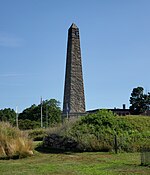Groton, Connecticut
1705 establishments in ConnecticutGroton, ConnecticutPopulated coastal places in ConnecticutPopulated places established in 1705Populated places on the Thames River (Connecticut) ... and 4 more
Towns in ConnecticutTowns in New London County, ConnecticutTowns in Southeastern Connecticut Planning Region, ConnecticutUse mdy dates from July 2023

Groton is a town in New London County, Connecticut located on the Thames River. It is the home of General Dynamics Electric Boat, which is the major contractor for submarine work for the United States Navy. The Naval Submarine Base New London is located in Groton, and the pharmaceutical company Pfizer is also a major employer. Avery Point in Groton is home to a regional campus of the University of Connecticut. The town is part of the Southeastern Connecticut Planning Region. The population was 38,411 at the 2020 census.
Excerpt from the Wikipedia article Groton, Connecticut (License: CC BY-SA 3.0, Authors, Images).Groton, Connecticut
Hamilton Avenue,
Geographical coordinates (GPS) Address Nearby Places Show on map
Geographical coordinates (GPS)
| Latitude | Longitude |
|---|---|
| N 41.348333333333 ° | E -72.0775 ° |
Address
Hamilton Avenue 41
06340 , City of Groton
United States
Open on Google Maps






